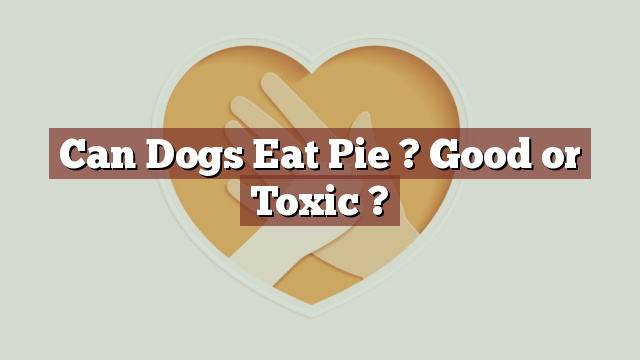Can dogs eat pie? Good or toxic?
As pet owners, it is important for us to know which foods are safe for our furry friends to consume. Can dogs eat pie? This is a common question that arises especially during holiday seasons when pies are a staple dessert. In this article, we will explore the nutritional value of pie, evaluate its safety for canine consumption, discuss potential risks or benefits, and provide guidance on what to do if your dog happens to eat pie.
Nutritional Value of Pie: Exploring the Ingredients and Their Benefits for Dogs
Pie is a delicious treat that typically contains a variety of ingredients. The nutritional value of pie can vary depending on its filling, crust, and toppings. Fruit pies, such as apple or pumpkin, may offer some health benefits for dogs. These fruits are rich in vitamins and antioxidants that can support their overall well-being. However, it is important to note that the crust and added sugars in pie can contribute to weight gain and other health issues in dogs if consumed in excessive amounts.
Can Dogs Eat Pie? Evaluating the Safety and Potential Toxicity for Canine Consumption
Dogs should not eat pie. While some pie ingredients may be safe for dogs, the overall composition of pie can be harmful to their health. Many pies contain ingredients such as chocolate, raisins, or xylitol, which are toxic to dogs. Chocolate, in particular, contains theobromine that can lead to symptoms such as vomiting, diarrhea, rapid breathing, and even seizures in dogs. Raisins are known to cause kidney failure in some canines, and xylitol, a common sweetener in pies, can lead to a dangerous drop in blood sugar levels and liver damage in dogs. It is crucial to keep pies and similar desserts out of reach from dogs to avoid any accidental ingestion.
Potential Risks or Benefits: How Pie May Impact the Health of Dogs
When it comes to the potential risks or benefits of pie, it is clear that the risks outweigh any potential benefits for dogs. The high sugar content in pies can contribute to obesity, diabetes, and dental issues in dogs. Additionally, the ingredients mentioned earlier, such as chocolate, raisins, and xylitol, pose significant health risks and should be strictly avoided. While some fruits in pie fillings may offer nutritional value, it is best to provide dogs with fresh, dog-friendly fruits as a safer alternative.
What to Do If Your Dog Eats Pie: Steps to Take and Possible Concerns
If your dog happens to ingest pie, it is important to take immediate action. Firstly, assess the situation and determine if the ingested pie contains any potentially toxic ingredients. If it does, contact your veterinarian immediately. Time is of the essence when it comes to dealing with toxic food ingestion. Your vet will be able to provide you with the necessary guidance and potentially induce vomiting if deemed necessary. Even if the pie does not contain any toxic ingredients, it is still advisable to monitor your dog for any unusual symptoms such as vomiting, diarrhea, or lethargy, and consult with your veterinarian if any concerns arise.
Conclusion: Weighing the Pros and Cons of Allowing Dogs to Have Pie
In conclusion, it is clear that dogs should not eat pie. While some pie ingredients may offer nutritional value, the potential risks associated with toxic ingredients and high sugar content outweigh any potential benefits. It is our responsibility as pet owners to ensure the safety and well-being of our dogs by keeping pies and similar desserts out of their reach. If your dog accidentally consumes pie, consult your veterinarian immediately to address any potential health concerns. Remember, it is always better to be safe than sorry when it comes to our beloved furry companions.
Thank you for investing your time in exploring [page_title] on Can-Eat.org. Our goal is to provide readers like you with thorough and reliable information about various dietary topics. Each article, including [page_title], stems from diligent research and a passion for understanding the nuances of our food choices. We believe that knowledge is a vital step towards making informed and healthy decisions. However, while "[page_title]" sheds light on its specific topic, it's crucial to remember that everyone's body reacts differently to foods and dietary changes. What might be beneficial for one person could have different effects on another. Before you consider integrating suggestions or insights from "[page_title]" into your diet, it's always wise to consult with a nutritionist or healthcare professional. Their specialized knowledge ensures that you're making choices best suited to your individual health needs. As you navigate [page_title], be mindful of potential allergies, intolerances, or unique dietary requirements you may have. No singular article can capture the vast diversity of human health, and individualized guidance is invaluable. The content provided in [page_title] serves as a general guide. It is not, by any means, a substitute for personalized medical or nutritional advice. Your health should always be the top priority, and professional guidance is the best path forward. In your journey towards a balanced and nutritious lifestyle, we hope that [page_title] serves as a helpful stepping stone. Remember, informed decisions lead to healthier outcomes. Thank you for trusting Can-Eat.org. Continue exploring, learning, and prioritizing your health. Cheers to a well-informed and healthier future!

